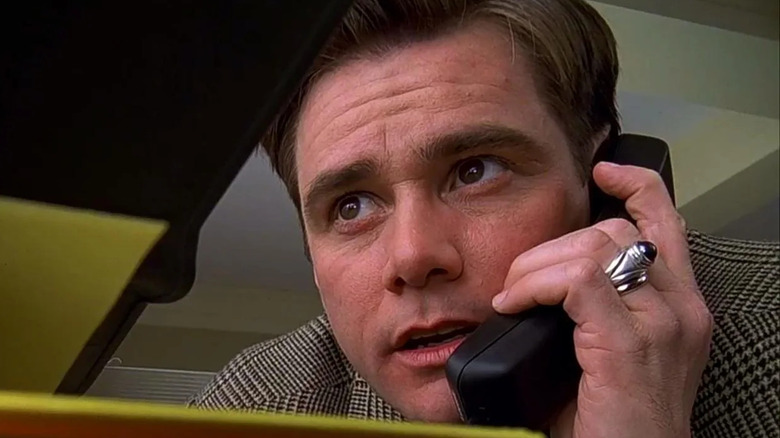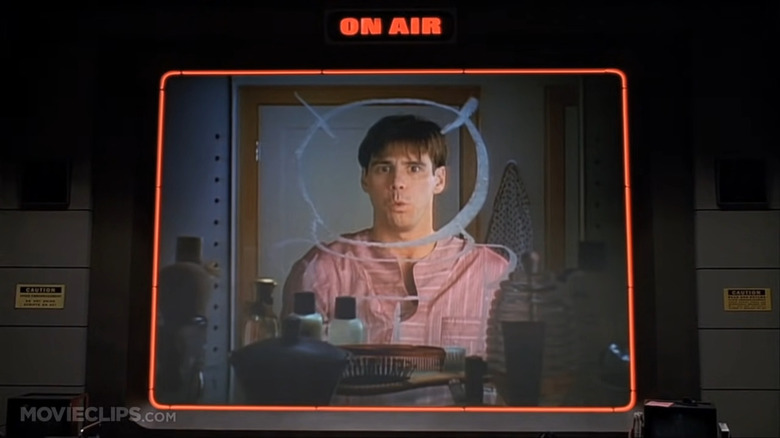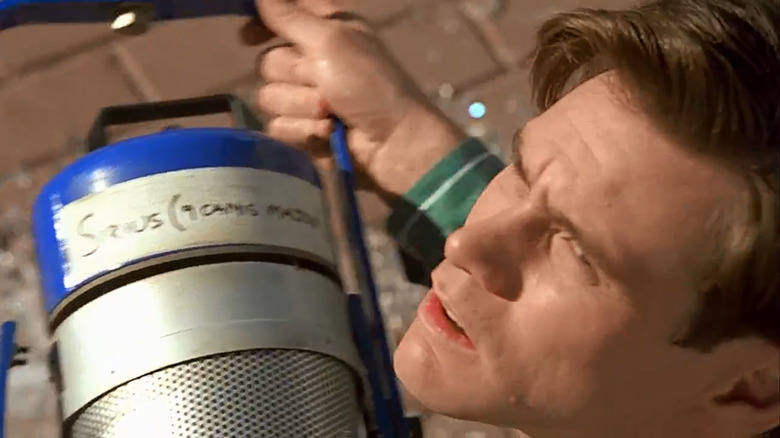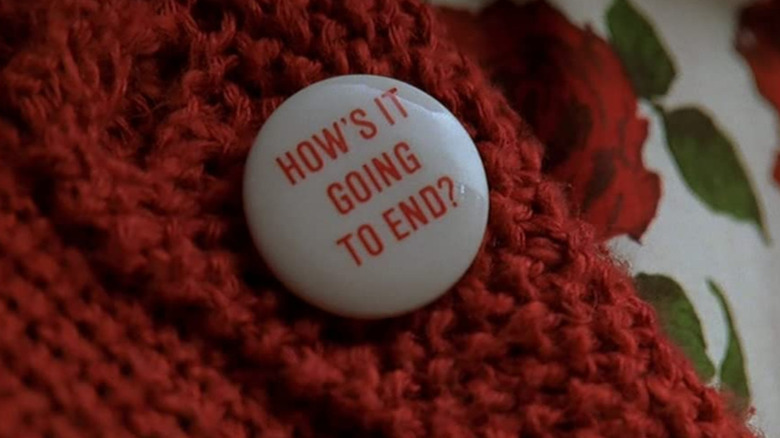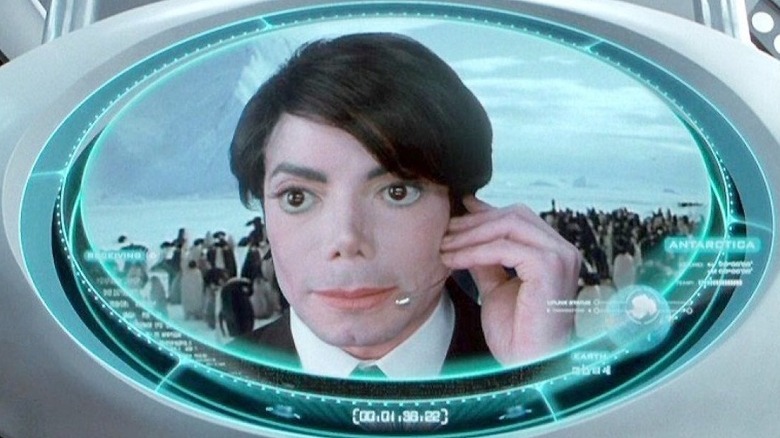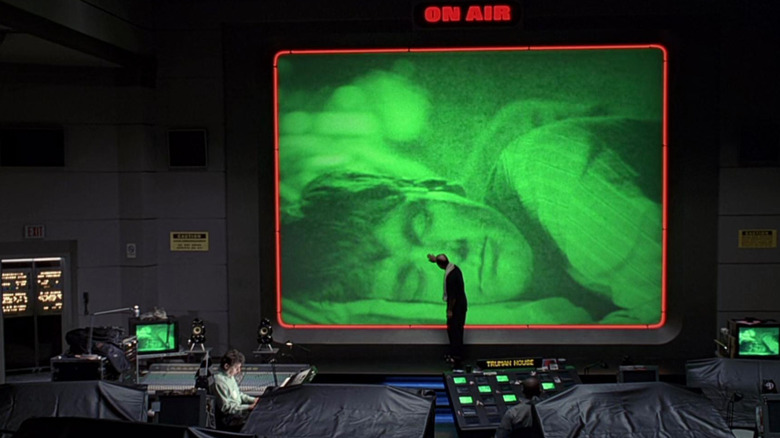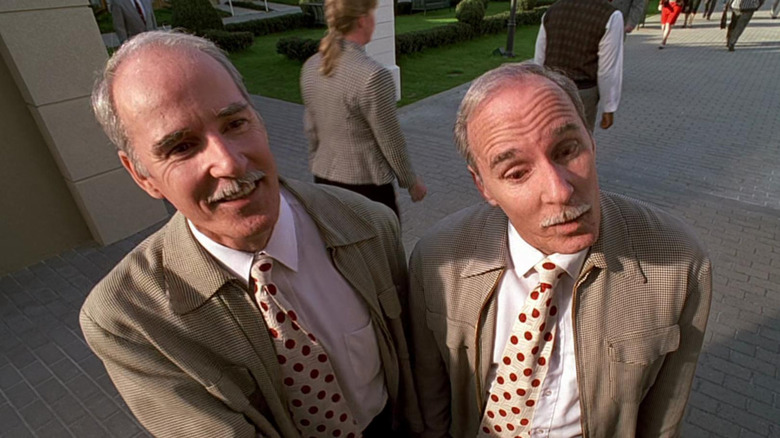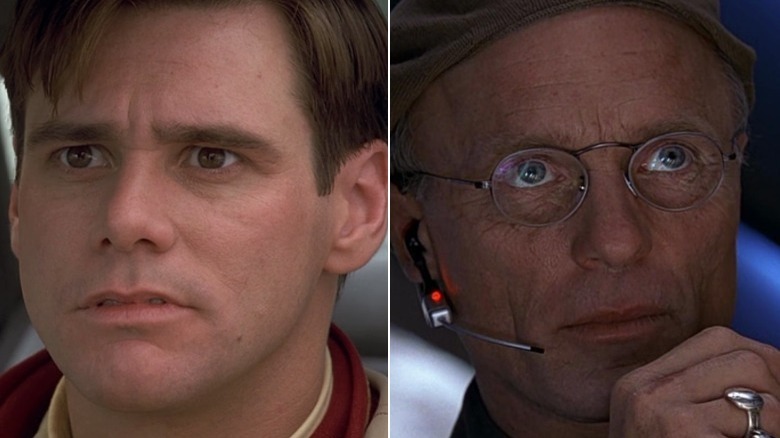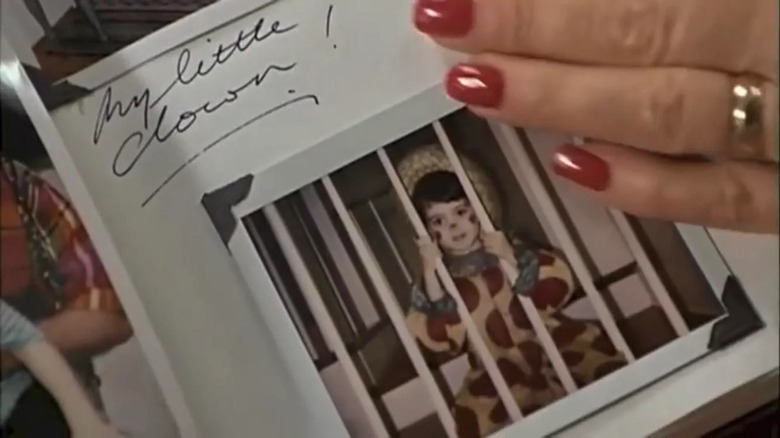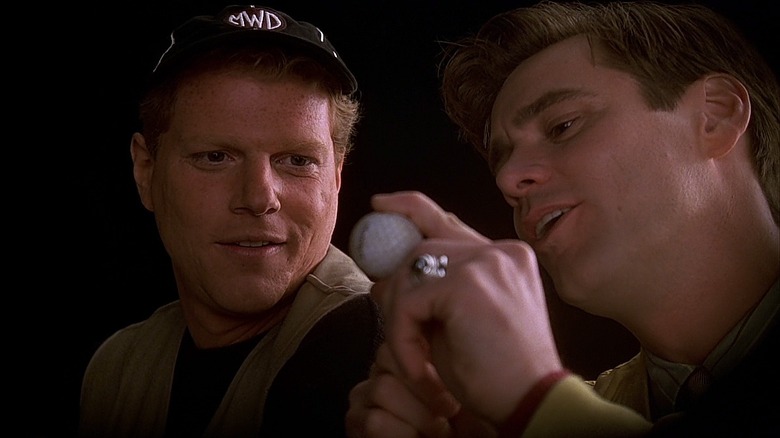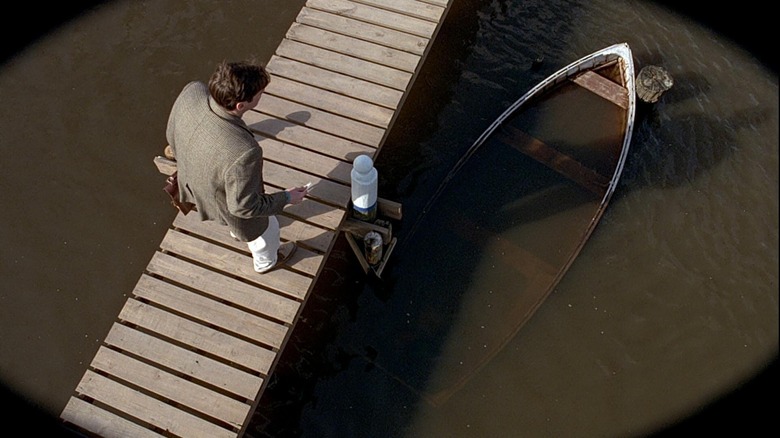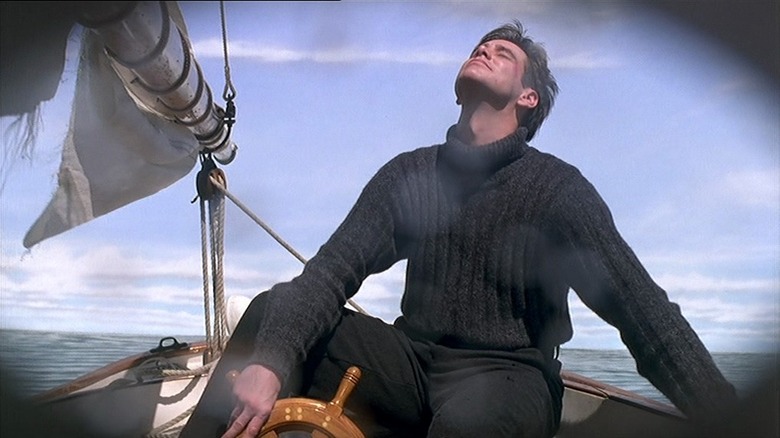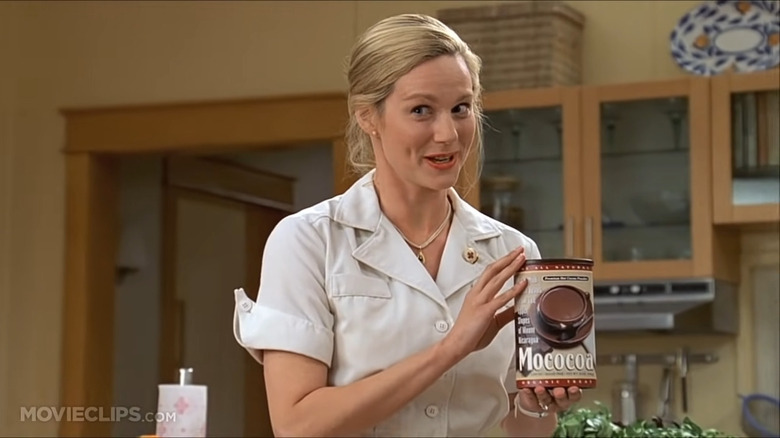The Untold Truth Of The Truman Show
Peter Weir's award-winning film, "The Truman Show," which PopOptiq's Scott Patterson describes as an "intellectual and emotional masterpiece," is a compelling and poignant blend of comedy, drama, satire, and surrealism. What's more, Jim Carrey — then famous for movies like "Dumb and Dumber" — impressed audiences and critics alike by showing off his incredible emotional range as an actor. He plays Truman Burbank, an insurance salesman who begins to question the authenticity of his entire life as he nears his thirtieth birthday and finds that he's been the subject of a lifelong deception (and the captive star of his own reality show).
Notably, "The Truman Show" also serves as a harbinger for the rise of reality TV, a genre that would become exceptionally popular after the film's 1998 release. The Hollywood Insider's Ben Ross called the film "prophetic," Vulture's James Charisma referred to it as a "digital-age Nostradamus" before going on to explore all the ways "this movie predicted the future." Vanity Fair's Julie Miller described it as particularly haunting when juxtaposed with constant digital surveillance and the current breadth of reality television. With all of this in mind, it's easy to see why this thought-provoking and heartfelt narrative has left such a lasting mark.
It's the fastest Jim Carrey has ever said yes to a role
In an exclusive interview with Screen Rant, Jim Carrey reveals that "The Truman Show" is the fastest he's ever said yes to a role. As he tells it, he had been thinking about a similar idea "two years before...but couldn't break the code. And then when [he] was handed the script...[he] read it and knew probably within ten pages that [he] had to do the movie. It was not a question."
In fact, Carrey was so interested in seizing the opportunity to stretch his wings as an actor and delve into drama that he basically paid for the chance by agreeing to a steep 40 percent pay cut, changing his then-standard $20 million fee to a salary of $12 million (via Variety). Seeing obvious potential in the comedic actor, director Peter Weir offered up his own notable sign of faith by waiting a full year to start production so Carrey could finish up his other projects (via Vanity Fair).
We're just glad the stars aligned here: In the role of Truman, Carrey proves to the world that not only can he evoke laughter from the audience, but he can also stun them with captivating, heartbreaking performances in films with higher emotional stakes.
The creators owe a debt to Philip K. Dick
Many, like Medium's James on Film, believe "The Truman Show" was inspired by a 1989 episode of "The Twilight Zone" called "Special Service," in which a man finds a hidden camera behind his bathroom mirror and learns his life is being broadcast to the world 24/7. Some, like Paste Magazine's Oktay Ege Kozak, point instead to the similarities between "The Truman Show" and a 1960 episode of "The Twilight Zone" called "A World of Difference," where a stunned man discovers he's actually an actor on a show — and not who he originally thought. Others still, like Entertainment Weekly's Donald Liebenson, note the striking parallels between this beloved satirical dramedy and Paul Bartel's 1966 short, "The Secret Cinema," which follows a woman who's convinced that those around her — from her boyfriend to her co-workers — are secretly filming her (via Los Angeles Times).
Before any of that, though, there was Philip K. Dick's 1959 dystopian novel, "Time Out of Joint." Here, protagonist Ragle Gumm resides in a quiet suburb, spending his time winning cash prizes in a local newspaper contest. But when he starts noticing strange things, like a phone book with numbers that don't work, the world he once perceived as reality begins to deteriorate before his very eyes. The more aware he becomes, the more he notices the deceptions around him. Sounds familiar, right?
The Truman Show could've been a horror movie
According to Dazed's Adam White, the script went through more than 16 rewrites. In its first iteration, it was much darker than the film we know and love today. Set in a fake New York City, the earlier narratives followed an alcoholic and "emotionally disengaged" protagonist who ignored a staged assault and threatened a baby once he started becoming more aware of his situation.
On top of that, in an interview with BFI, screenwriter Andrew Niccol reveals that Brian De Palma of "Scarface" and "Carrie" fame was originally slated to direct, but stepped down because he couldn't imagine Jim Carrey as Truman. In fact, before Peter Weir took the reins, the production company even offered the vacant directorial spot to David Cronenberg, known for horror films like "Scanners" and "The Fly" (via Los Angeles Times).
So it's fair to say that if De Palma hadn't stepped down, if Cronenberg hadn't turned down directing duties after that, or if the production company had greenlit an earlier script, "The Truman Show" would have been a bleaker and even more terrifying ride. Weir, however, lightened the content, infused more humor, and set the story in a picturesque seaside town rather than a rain-drenched city. In doing so, he gave us a heartfelt, legacy-making gem of a satirical dramedy, while still preserving some haunting notes of horror throughout the movie.
Michael Jackson is a real-life Truman
A blog called Vindicating Michael Jackson digs into the similarities between Truman and the late King of Pop himself, noting that both were raised in front of cameras while being cheered (and scrutinized) by adoring, voyeuristic fans. But while a pained, triumphant, and notably fictional Truman eventually breaks away from the world he's known — surely with hopes of finding Sylvia, the one person in his past who gave him his only genuine relationship — the very real Jackson never escaped his own oppressive universe.
To cement the comparison, the blog's author points to a Popdirt post as proof that the former star served as a direct inspiration for the movie. According to the post, which cites a since-lost 1998 interview, director Peter Weir has claimed that "Michael Jackson is Truman...he's the nearest thing to Truman." And there's no denying that Jackson endured a Truman-like existence.
In his interview with Independent's Sheila Johnston, though, Weir has instead pointed to the late Princess Diana, who died in an infamous car accident while he was editing the film, as a real-life Truman. Recalling her violent fate, he notes: "It was hard not to make comparisons. If there had been cameras trained on her ... people would have gone on watching. The romantic tryst ... she's coming out of the Ritz ... and then ... she's going to die. It was fascinating ... the agony the audience was feeling. Yet the paparazzi were working for them. We are complicit in creating the monster."
Pink Floyd served as early musical inspiration
In a podcast interview with Classical California KUSC, Peter Weir discusses the fascinating role music plays in "The Truman Show" and how he approached the score. To Weir, instrumental pieces are ideal when it comes to channeling creative inspiration, and around the 27-minute mark of the interview, he talks about how he was initially drawn to the work of American composer Philip Glass. During shooting, Weir would play Glass's compositions against the day's work. In fact, when Weir eventually reached out to Glass, he asked the composer to sit in on these experimental sessions with him.
As we already know, the soundtrack we eventually get is a lovely, tailored collection of Burkhard Dallwitz, Philip Glass, and classical composers. But in this interview, Weir reveals that Pink Floyd's "Wish You Were Here" served as the movie's unofficial theme song after his son noted the distinct parallels between the movie's narrative and the story the track depicts. Weir would go on to use the song as supporting material when describing the film to the head of production at Paramount. Though he had plans to buy this (very expensive) song to use in the film, he ultimately decided it had served its purpose as inspiration.
The twins were originally on set to direct traffic
Remember those identical twins — the ones who jostle Truman around a bit, presumably to better position him for all the hidden cameras? Well, according to People, these brothers, who "watch the same TV shows, drink the same coffee (black, one sugar) ... cut each other's hair" and even "went into the Army together, became cops together (both are lieutenants) and grew mustaches together," were originally on the set of "The Truman Show" to direct traffic — not to act opposite Jim Carrey. As it turns out, Ron and Don Taylor landed their featured roles when director Peter Weir saw just how friendly the two were to the rest of the cast and crew, and how willing they were to goof around on set. As Ron Taylor tells it, Weir certainly "didn't have to ask twice."
Notably, in one Reddit thread in which a user shares this fun little piece of movie trivia, another Redditor casually comments that the Taylor brothers — their real-life uncles — were actually hired as security guards, not traffic directors, and that the two "volunteered...to be a part of the movie" because they lived near Seaside, Florida, where the movie was filmed, and "because [the poster] played 4-year-old Truman." The Redditor, u/ImArkadius, even has some photographic evidence for proof!
Jim Carrey and Ed Harris never met during production
While the late Dennis Hopper was initially cast as Christof, the egotistical creator of "The Truman Show," creative differences prevailed, resulting in him getting the boot. Though Hopper's departure happened in the early days of filming, the production team didn't recast the role until the eleventh hour — when they were finally faced with the reality of shutting down because they still didn't have a replacement for the film's main antagonist. Their fateful answer came in the form of Ed Harris (via Den of Geek). As luck would have it, the team was shooting in Malibu at the time, near where Harris lived. The actor told the Hollywood Reporter's Seth Abramavitch that he "drove up the coast to meet with Peter [Weir]" and began working the very next week, giving Harris just one short weekend to develop the character.
Because he joined the cast so late in the game, all of Carrey's scenes as Truman had already been filmed, meaning they never actually met each other on set. Instead, the two "met after production wrapped" (via Giant Freakin Robot).
In a way, the entire situation feels thematically appropriate. After all, Christof is essentially an unseen god to Truman — one who's controlled the poor guy's entire existence. The two characters only "meet" at the end of the film (and even then, Christof is just a disembodied voice to our protagonist), when Truman decides to leave the dome behind.
Peter Weir wanted a real meta moment in the theaters
"The Truman Show" is full of meta-fictional moments meant to emphasize the fact that Truman's world is a mere imitation of the real one, with an oblivious, imprisoned "clown" entertaining a worldwide audience while the production team advertises various goods in order to keep their 24-hour show running. These run the gamut from Truman taking vitamin D pills because he only gets artificial sunlight to the rampant product placement to the active discouragement of his interest in travel. After all, no real travel agency has a poster of an airplane getting hit by lightning paired with text that says, "It could happen to you!" (via Bored Panda).
In one scene, we see Marlon restocking the candy machine while he's talking to Truman to stall him. In another, we glimpse Paul Giamatti's character looking for jobs when he starts to fear the show's impending cancellation. We even get the Truman Bar, where people experience Truman's life as they bond over drinks and watch his existential crisis unfold onscreen.
Apparently, Weir even fantasized about going one step further with all this meta-ness and cultural commentary by installing cameras behind movie theater screen projectors across the country so projectionists could flip the camera on the audience at some point before cutting back to the film (via Cinephilia & Beyond), making viewers part of the movie.
Marlon was originally a more sympathetic character
One of the most heartbreaking things about "The Truman Show" is that everything about Truman's life is fake — including his relationships with other people. But a number of deleted scenes reveal that before the final cut, a more sympathetic version of Truman's "best friend" Marlon, played by Noah Emmerich, existed. The Marlon we've come to know is the one who looks Truman straight in the eye and tells him he isn't "in on it," but earlier iterations of the character paint a picture of a morally conflicted actor who grew up on the show as a child star, and who's struggled with the part he's played in this grand deception for years.
Film Daze's Alex Dewing points to one particular scene in which the "Truman Show" cast is sitting around a table with a new script for the coming weeks. Marlon/Louis "fidgets and protests, accusing" Christof "of stopping at nothing to get the show back to its normal routine, even if that means Truman's death."
In another scene, we see a runaway Truman disguised as a homeless man, attempting to evade a search party. While Marlon/Louis finds — and recognizes — Truman, he walks away rather than turning him in (via Mirror).
Gene Siskel and Roger Ebert admitted they were wrong
From 1986 to 2010, legendary movie critics Gene Siskel and Roger Ebert hosted a talk show called "At the Movies," where they would discuss films before rating them with a thumbs up or thumbs down. Following Carrey's performance in "The Truman Show," the two men dedicated an entire episode to the actor, commending his career trajectory and acknowledging they were wrong to suggest he retire immediately after "Ace Ventura: Pet Detective."
In the episode, Ebert, who once said Carrey had no future in acting, offers up both praise and some very specific acting advice, telling him to leave the "slice of life" movies to others. According to Ebert, Carrey's talents are best suited to "the fanciful side of realism." Ultimately, "The Truman Show" garnered two thumbs up from the critics, and Ebert went on to give the movie four stars in his own written review, calling Carrey's performance "well-planned," and saying that not only did he enjoy the movie, he "liked Truman in the same way [he] liked Forrest Gump — because he was a good man, honest, and easy to sympathize with." And when there's video evidence of critics who once loathed an actor hailing that same actor with applause and admiration, well, that's when you know he's made quite a mark.
Jim Carrey almost drowned while filming the climactic scene
In the film's climactic scene, we see the aqua-phobic Truman taking to the water in his determination to leave Seahaven behind. This is no small feat for him considering that, when he was just a kid, the show's production team manufactured a deeply traumatizing event — making him believe he lost his father at sea and that he was partly at fault — as a way to discourage his wanderlust. Truman spends the rest of his life "appropriately" terrified of the bay — at least until he finally comes to realize everything is a lie. Unfortunately, Christof still isn't willing to let Truman go, and even demands that the team use the dome's violent weather system to keep the star of his show contained. And if doing so kills Truman? Well, that's just a risk the creator is willing to take.
Turns out, Jim Carrey may have found himself just as traumatized as Truman while filming this scene. Recounting his experience of almost drowning to Vanity Fair, Carrey talks about how, in the footage, he's "actually giving" the divers under the water a distress sign, "which was a clenched fist," but they ignored it because "they just saw it as acting." Carrey continues the terrifying tale by describing how, "with the last breath, with the last hint of consciousness, [he]...spun and made...gigantic strokes toward the back of the storm and came up outside the storm gasping for air and exhausted."
There's a form of psychosis called Truman Show delusion
Not many movies have an entire psychiatric condition named after them. But in 2008, 10 years after the film's release, the New York Times reported that a growing number of people were suffering delusions of grandeur, viewing their lives as inauthentic, staged reality shows, and feeling like they were under constant video surveillance.
Many patients pointed to "The Truman Show" as a way to describe what they were experiencing, leading New York-based psychiatrist Joel Gold and his brother Ian to coin the term "Truman Show delusion" (also sometimes referred to as "Truman syndrome"). According to Gold, the movie didn't necessarily give rise to this form of psychosis: It's always been around. He goes on to explain that the condition evolves with technology, citing how, "Throughout history ... people have felt controlled by whatever the technology of the day happened to be" (via Business Insider). So, basically, "The Truman Show" just gave people an easy way to describe their own paranoia-laced struggles.
In fact, screenwriter Andrew Niccol's direct inspiration for the original script may have actually come from his own lived experience — and his own paranoia (via Independent). The concept of being watched, and the world itself being fake, has plagued Niccol's mind since childhood, when he felt like "everything around him was nothing more than a charade" (via Vanity Fair). Decades after the film's release, Niccol, who still describes his life as Truman-esque, hasn't shaken that feeling (via Wired).
